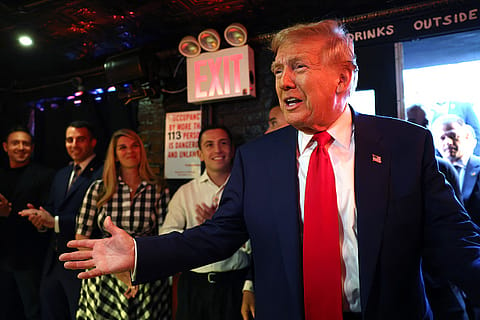Global automakers’ debt pile-up hits $1.3 trn even as Trump slams EV brakes
Hybrids gain momentum as Trump’s anti-EV policy and automakers’ mounting losses reshape the road to an electric future

On the first day of his return to the White House, President Donald Trump made an unexpected move: he revoked an executive order championed by his predecessor, Joe Biden, aimed at electrifying the future of American mobility. The 2021 order sought to ensure that half of all vehicles sold in the U.S. by 2030 would be electric. Trump’s decision, coupled with a mounting debt crisis within the automotive industry, signals a challenging road ahead for the global EV transition.
A financial analysis by Fortune India revealed that the world’s leading automakers have amassed a staggering $1.3 trillion in debt. Among them, the top 13 automakers — including EV titan Tesla — hold this burden, which drops to $790 billion when adjusted for net cash. This mountain of debt raises questions about the industry's sustainability as automakers contend with rising interest rates and declining EV profitability.
Boston Consulting Group’s recent study encapsulates the challenge: automakers, on average, lose $5,000 on every $50,000 worth of EVs sold. Ford’s EV losses reportedly soared to $100,000 per unit in the first quarter of 2024. The report underscores a grim reality: even as production scales and technology improves, the profitability gap remains significant.
While U.S. EV sales grew by 7% last year to a record 1.3 million units, hybrids are increasingly stealing the spotlight. Legacy automakers like Toyota, Volkswagen, and Ford have scaled back their EV ambitions. Toyota, the pioneer of hybrids with its iconic Prius, recently slashed its global EV production target from 1.5 million to 1 million units by 2026. This strategy reflects a growing consensus to treat hybrids as a bridge to the next generation of fully electric models.
Ford CEO Jim Farley highlighted the company’s commitment to hybrids during a recent earnings call, citing the brand’s 80% share in the hybrid pickup market. "A lot of our competitors shunned hybrids, and now they’re scrambling," Farley remarked. Ford aims to increase hybrid sales by 40% this year and quadruple them in the near future, positioning hybrids as a pragmatic option for consumers wary of fully electric vehicles.
Trump’s Anti-EV Stance
Trump’s executive order halting Biden’s EV initiatives underscores his administration’s scepticism of government-led market interventions. The order stops the allocation of unspent funds for EV charging stations from a $5 billion fund and revokes California’s waiver to enforce zero-emission vehicle mandates. Additionally, the administration is reviewing the viability of EV tax credits, arguing these measures create unfair market distortions.
Recommended Stories
While this policy aligns with Trump’s pro-market stance, it injects uncertainty into the automotive sector. Fitch Ratings’ 2025 outlook warns that regulatory inconsistencies could stifle EV adoption in the U.S. and Europe, even as China’s EV market continues its steady growth. China’s dominance looms large, with BYD nearing Tesla’s crown as the world’s largest EV maker. The BCG report also flagged the impact of Chinese imports on global markets, warning that aggressive pricing strategies could erode profitability for legacy automakers.
The Missing Spark
Despite these challenges, some automakers are doubling down on their EV commitments. Honda, for instance, has pledged $65 billion toward EV and fuel-cell vehicle development through 2030. The company’s ambitious goal to achieve a fully electric lineup by 2040 contrasts sharply with the cautious approach of its peers.
Meanwhile, Ford, Toyota, and other legacy giants are hedging their bets, prioritising hybrids to ease consumers into an electric future. As Ford CFO John Lawler noted, the industry’s uncertain economic climate necessitates strong cash reserves. "Were there to be a global disruption, we would be very pleased having this cash in hand," he said.
(INR CR)
In short, the transition to electric vehicles — once heralded as the inevitable future of mobility — now resembles a winding, uphill journey.